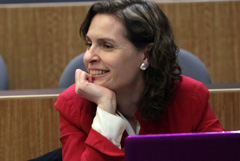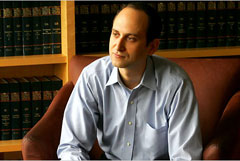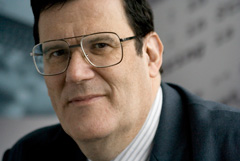
maps.google.com
Computers and Society is an undergraduate course at the Courant Institute of Mathematical Sciences at NYU. Led by Evan Korth, it addresses the impact of networked computers on individuals, organizations and modern society as a whole, as well as the social, political and ethical issues involved in technological industries. This course was revived by Professor Korth for the spring 2006 semester after being dormant since the 80's. The course is structured to promote student interaction with the broader web community, primarily through a speaker series including many influential guest speakers.
Join the class mailing list for updates on upcoming guest speakers and special events. This list open to the public.
All events are open to the public in room 109 of Warren Weaver Hall
251 Mercer Street / New York, NY 10012 / Map
Computers and Society lectures and events are held mostly during semesters when the class is being taught. The class will be taught next during the fall, 2010 semester. All future events will be posted here as they are confirmed.
What will the interface between people and computers look like in five years? In ten years? In twenty five years? Will we still have screens? Keyboards? Will we all be seeing Princess Leia in a beam of light? Based on current trends and inspired guesswork, we will go together on a tour of the future.
Ken Perlin is a professor in the Department of Computer Science at New York University and directs the NYU Games For Learning Institute. He was also founding director of the Media Research Laboratory and director of the NYU Center for Advanced Technology. His research interests include graphics, animation, user interfaces, science education and multimedia.
Music has always served as a map for social organization, and vice versa. Today, new networked communications technologies are changing the way we connect, and changing our musical patterns, as well. Yet our laws, economies and ethics are still moored in a linear, hierarchical mode, producing a massive quantity of friction, and turning hundreds of millions of us into unwitting lawbreakers. Will the new, networked ethic succeed in reforming musical culture and industry? Or will the forces of the status quo successfully squelch this emerging social and cultural dynamic?
Aram Sinnreich is an assistant professor at Rutgers University's School of Communication and Information, and the author of the recent book "Mashed Up: Music, Technology and the Rise of Configurable Culture." He has written about music and technology for The New York Times, Billboard, and Wired News, has testified as an expert witness in several cases including the Supreme Court file sharing suit MGM vs. Grokster, and has offered his expertise as an analyst and consultant to hundreds of companies, from major labels to fledgling startups, since 1997.

Susan Crawford is a professor at Cardozo Law School in New York City and a Visiting Research Collaborator at Princeton's Center for Information Technology Policy. She was a full professor at the University of Michigan Law School between July 1, 2008 and July 1, 2010. She was on leave from Michigan to co-lead the FCC Agency Review team for the Obama-Biden transition (11/08-1/09), and served as Special Assistant to the President for Science, Technology, and Innovation Policy (2009). As an academic, she teaches internet law and communications law. She is a member of the boards of Public Knowledge and TPRC. She was a member of the board of directors of ICANN from 2005-2008 and is the founder of OneWebDay, a global Earth Day for the internet that takes place each Sept. 22. One of Fast Company's Most Influential Women in Technology (2009); IP3 Awardee (2010).
When human beings acquired language, we learned not just how to listen but how to speak. When we gained literacy, we learned not just how to read but how to write. And as we move into an increasingly digital reality, we must learn not just how to use programs but how to make them.
Rushkoff is the media theorist who first coined terms such as 'viral media,' 'social currency,' and 'screenagers.' He is the author of a dozen books on media, culture, and technology, the correspondent for several Frontline documentaries, and has taught at ITP since the mid-90?s. A columnist for The Daily Beast and Arthur Magazine, his articles have been regularly published in The New York Times and Discover, among many other publications. His radio commentaries air on NPR and WFMU, his opeds appear in the New York Times, and he is a familiar face on television, from ABC News to The Colbert Report.
OMFG privacy is dead, your identity is GONE and I'm reformatting your phone, too! Really? We'll discuss the kinds of data you expose online and the net architecture that makes hiding impossible. We'll examine how different systems harvest and analyze data, why sharing data can be GOOD, and what you should know to make informed decisions.
Hilary is a computer science professor with a background in machine learning, data mining, and web applications. She is currently on sabbatical to explore real-world implementations of these technologies. She is widely published and regularly speaks at academic and industry conferences, and recently realized her dream of delivering a talk on algorithms while drinking a dry ice martini. She is an enthusiastic developer and often releases code on her personal site, hilarymason.com.
Fred Benenson works for Kickstarter and was previously employed as a Creative Commons representative in NYC. He went to ITP and finished in 2008, but also went to NYU for undergrad in philosophy and computer science and started Free Culture @ NYU during his senior year. He now teaches undergrad and graduate students at NYU in copyright and cyberlaw.
Copyright is a hotly debated topic in many circles these days, and rightly so; the impact these rights have on the structure of our culture is hard to overstate. But we sometimes talk past each other based on misconceptions about what copyright really is. In this lecture we'll try to cover the basic structure of copyright law: what it does and doesn't cover, and what it does and doesn't control.
Evan is a startup and intellectual property attorney who teaches Copyright, Commerce, and Culture at NYU in the Department of Media, Culture, and Communication.
Christopher "moot" Poole is the founder of 4chan.org, a simple image-based bulletin board, which has grown from a niche site targeting anime fans to one of the most influential communities on the internet. With over 12 million users a month, many popular viral videos, internet phenomena, and memes get their start on 4chan. In 2010 Christopher was a featured speaker at the TED Conference, and he has been profiled by TIME, CNN, The Washington Post, and Technology Review. Recently he started a new project called Canvas, which is working on new and better ways for people to hang out and collaborate online.
"Benjamin Franzen and Kembrew McLeod's exceptionally smart and energetic documentary lays out the complexities of sampling, artistic and political, legal and philosophical. Comprised of split screens, overlapping and overlaid sounds, an assemblage of images and noise, the movie effectively stages its
argument even as it makes it."
-PopMatters.com
Legendary remixer Steve "Steinski" Stein, the inspiration for many recent artists including Girl Talk, will join producer Kembrew McLeod for the Q&A session after the screening. This event is sponsored by ISOC-NY, FreeCulture NYU , NYU ACM, Brooklyn Law Incubator & Policy Clinic, and tech@nyu.
Eben Moglen, Professor of Law and Legal History at Columbia University, and founder, Director-Counsel and Chairman of the Software Freedom Law Center, will speak about “Freedom in the Cloud: Software Freedom, Privacy and Security for Web 2.0 and Cloud Computing” on Friday, February 5, 2010, 7-9 pm. This event will be webcast live. This event is sponsored by ISOC-NY, NYU ACM, and Brooklyn Law Incubator & Policy Clinic
Memefactory is a performance for anyone who uses the internet. Whether you are perplexed by pictures of cats with awful spelling or spend over 9000 hours a week surfing image boards, we promise you'll either learn something or explode from overexposure to lulz. Sponsored by NYU's ACM Chapter and Free Culture @NYU
Bollier will discuss his new book, Viral Spiral, the first comprehensive history of the "free culture" movement and "sharing economy" that is empowering ordinary people, disrupting markets and changing politics and culture. Bollier is a leading American activist, author, blogger and proponent of "free culture" on the Internet and the commons. He is an editor of Onthecommons.org and Senior Fellow at the USC Annenberg School for Communication.
The goal of this conference was to outline the history of the last 25 years, discuss the current market issues, then give a view of the future of broadband and telecom in the US that has been mostly untold in the media. It is a future that leads to ubiquitous, very high speed networks based on an infrastructure that is open to all competitors ? giving customers choice, lower prices and new quality products and innovative services. And widely acknowledged as critical for long term economic growth.
Michel Bauwens is the founder of the Foundation for Peer-to-Peer Alternatives, a global research collaborative exploring peer production, governance, and property. He is currently Primavera Research Fellow at the University of Amsterdam and external expert at the Pontifical Academy of Social Sciences (2008). In his lecture, he argues that organizations that are structured like networks will out-compete traditional centralized organizations in the new green capitalism.
Andrew Rasiej is a social entrepreneur, Founder of Personal Democracy Forum, and co-founder of techPresident. He has served as an adviser to Senator Barack Obama, Senator Hillary Clinton, Senator Tom Daschle, Congressman Dick Gephardt, the Democratic Senatorial Campaign Committee and the Democratic Congressional Campaign Committee on the use of Information Technology for campaign and policy purposes. Mr. Rasiej also maintains the position of senior technology adviser for the Sunlight Foundation.
Released in December 2007 by the League of Noble Peers (Alan Toner, J.J. King, Jan Gerber, Sebastian Luetgert, Luca Lucarini, and others), Steal This Film 2 tries to go beyond the current discussions around file-sharing to look at what kinds of social change are precipitated by massive changes in our capacity to communicate. The film argues that the changes wrought by networked, peer distribution are historical on the scale of the printing press and tries to explain why.
Amanda Michel is Director of OffTheBus, citizen-powered political journalism. Since 2003 she has worked as National Director of Generation Dean, created and managed the MediaCorps program for the Kerry-Edwards campaign, co-founded the New Organizing Institute in the wake of the 2004 election, worked at Harvard's Berkman Center for Internet & Society, and worked on Assignment Zero, a Wired and NewAssignment.net collaboration.
The content industry has convinced industry in general that extremism in copyright regulation is good for business and economic growth. That's false. In this talk, Professor Lessig describes the creative and profitable future that culture and industry could realize, if only we gave up IP extremism.
Winner of the first Neil Postman award for Career Achievement in Public Intellectual Activity, Douglas Rushkoff is an author of ten best-selling books, a professor at NYU's Interactive Telecommunications Program and an award-winning documentarian who focuses on the ways people, cultures, and institutions create, share, and influence each other's values. His talk examined the cultural, historical, and economic developments that created our current system of governance, and outlined a path to open source democracy.
John Perry Barlow, American poet, essayist, and cyberactivist, explored the notion that the 2008 presidential election was the first true "Internet Election".
Fred Benenson, co-founder of Free Culture @ NYU, organizer of the first-of-their-kind DRM protests in 2005, and Cultural Programs Associate for Creative Commons in New York City, gave two lectures. The first discussed the effect of Copyright on creativity. The second discussed the Creative Commons and Free Culture movements.
Tim Westergren founded Pandora in January 2000 and now serves as its Chief Strategy Officer. Tim is an award winning composer, an accomplished musician and a record producer with 20 years of experience in the music industry. In his talk, he discussed the history of Pandora, and what happens when old content laws come up against the realities of the Internet.
OneWebDay has attracted a global network of partner organizations and individual activists committed to broadening the public's awareness of Internet and Web issues while deepening a culture of participation in building a Web that works for everyone.
Speaking at this event: Susan Crawford (founder - One Web Day) | Sree Sreenivasan (Columbia Journalism & WNBC-TV) |Andrew Baron (Rocketboom) | Craig Newmark (craigslist) | Dharma Dailey (Ethos Group) | Gale A. Brewer (NYC Council) | SJ Klein (OLPC) | Jonathan Zittrain (Harvard) | John Perry Barlow (EFF) | Tim Westergren (Pandora) | Lawrence Lessig (Stanford)
The 2008 elections mark a transformation of American politics as the internet and new media change the way millions get news and share information. From social networking to YouTube, industry leaders and trailblazers talk about how the rules of engagement are changing. You are invited to join a ground-breaking discussion on the role of new media in the 2008 elections. Media innovators will gather to talk about how the internet and digital media are transforming American politics, and what we should expect as the 2008 presidential campaigns continue.
Edward Hasbrouck is the author of the Practical Nomad series, a travel expert, award winning investigative journalist, and one of the world's leading advocates for the rights of travelers. Hasbrouck has more than 15 years experience as a travel industry insider and technology consultant, specializing in international airfares and reservations technology. He will discuss travel, especially air travel, and the current debates about ``homeland security'' technologies and practices since September 11th, 2001. Are the differences between travel records and other types of personal data (medical, financial, criminal) technological? Political? Both? Is the issue a ``balance'' between security and civil liberties, privacy and safety? Or is there some other agenda and set of interests at stake? This event is sponsored by Free Culture @NYU, NYU ACM, WinC, and InfoLaw/NYU.
Rosen teaches journalism at New York University, where he has been on the faculty since 1986. Rosen is the author of PressThink, a weblog about journalism and its ordeals (www.pressthink.org), which he introduced in September 2003. By March 2007, it had received 2 million visits. In June 2005, PressThink won the Reporters Without Borders 2005 Freedom Blog award for outstanding defense of free expression. In 1999, Yale University Press published Rosen's book, "What Are Journalists For?", which is about the rise of the civic journalism movement.
Stallman will discuss the goals and philosophy of the Free Software Movement, and the status and history of the GNU operating system, which in combination with the kernel Linux, is now used by tens of millions of users worldwide. This event is sponsored by Free Culture @NYU, NYU ACM, WinC, and InfoLaw/NYU.
Cory co-edits the massively popular BoingBoing.net (the internet's second most popular blog according to technorati.com), writes sci-fi novels that are released under Creative Commons licenses, and is a dedicated copyfighter who serves on the board of numerous organizations
Jimmy Wales, founder of Wikipedia, will give a brief background on open source software, how it works, and the fact that you can be commercially successful doing and using it. He will also discuss Wikia and the Wikimedia Foundation.
The DMCA is one of the most controversial laws in copyright. It not only forbids picking the digital locks that protect against copyrighted works, but also forbids anyone to explain how to pick digital locks. While many consider the DMCA unconstitutional, others simply accept it as a bad law that creators and activists must work around. Join us as James Boyle and Free Culture @NYU ask whether or not the DMCA is worth fighting over, and what we're risking by paying too close attention to it.
 Photo by Ruby Washington/The New York Times - Some RightsReserved
Photo by Ruby Washington/The New York Times - Some RightsReservedLawrence Norden is Senior Counsel in the Brennan Center's Democracy Program. In his capacity as director of the Brennan Center's Voting Technology Project, Mr. Norden has authored several nationally recognized reports and articles related to voting rights, voting systems and election administration.
"Globalization is a loaded term. It's difficult to define because the use of it is sometimes at the center of an ideology. When talking about globalization, we need to distinguish among three kinds: social, economic, and technological. Of course, there's overlap..."

"He who receives an idea from me, receives instruction himself without lessening mine; as he who lights his taper at mine, receives light without darkening me. That ideas should freely spread from one to another over the globe, for the moral and mutual instruction of man, and improvement of his condition, seems to have been peculiarly and benevolently designed by nature, when she made them, like fire, expansible over all space, without lessening their density in any point, and like the air in which we breathe, move, and have our physical being, incapable of confinement or exclusive appropriation. Inventions then cannot, in nature, be a subject of property. Society may give an exclusive right to the profits arising from them, as an encouragement to men to pursue ideas which may produce utility, but this may or may not be done, according to the will and convenience of the society, without claim or complaint from anybody..."
Peter Bergen is a fellow at the New America Foundation in Washington, D.C., an Adjunct Professor at the School of Advanced International Studies at Johns Hopkins University, and CNN's terrorism analyst. Bergen will talk about how the jihadist movement morphed after 9/11, becoming more virtual, less organized and less hierarchical. And what we can expect from Al Qaeda 2.0 in the future. This event is sponsored by Free Culture @NYU, NYU ACM, and WinC.